- Home
- Alan MacDonald
Superhero School
Superhero School Read online
CONTENTS
Chapter 1
Chapter 2
Chapter 3
Chapter 4
Chapter 5
Chapter 6
Chapter 7
Chapter 8
Chapter 9
Chapter 10
Chapter 11
Chapter 12
Chapter 13
Mrs Button poked her head round the door. ‘How many times? No jumping on the bed!’
‘But Dangerboy has to save mankind from Dr Doom!’ said Stan.
‘Well, tell Dangerboy his dinner’s getting cold.’
Stan sighed. By now Dr Doom would be halfway to his secret volcano lair. Stan peeled off his superhero mask and hung it on the bedpost. He’d have to finish saving the world after dinner.
Halfway downstairs he stopped and scratched his left ear. It was tingling, which probably meant sprouts for supper.
‘Come on, lad, we’re hungry,’ said Mr Button, looking up.
‘I had to practise my surprise attack move,’ said Stan. ‘Dr Doom was getting away . . .’
‘Well, if he’s a doctor, he’s probably very busy,’ said Mrs Button.
Stan sat down and looked at his plate. His tingling ear never failed.
Mr Button speared a chip on his fork. ‘Have you given any thought to what you might like to be if you don’t become an – um – superhero?’
‘I’ll be a superhero,’ said Stan without hesitation.
‘Yes, but it’s good to have other options,’ said Mrs Button.
‘And it’s good to have ambition,’ Mr Button sighed. ‘But not everyone can be a superhero. Do you actually know any superheroes?’
‘What about Captain Courageous?’ said Stan.
Every week the Gormley Gazette reported on Captain Courageous’s latest daring adventures. Stan had pictures and posters of him all over his walls. Beside his bed was a plastic model of the superhero that he’d got free in a packet of cornflakes.
‘Exactly,’ said Mr Button.
‘What do you mean?’ asked Stan.
‘Well, he can fly and he’s got superpowers. It’s difficult to learn things like that.’
‘Maybe he started off by jumping on the bed too,’ said Stan. ‘Then one day he discovered he could fly. That’s why I need to practise.’
‘What for?’
‘So that I’m ready,’ said Stan, smearing a chip with ketchup. ‘You don’t know – I could get a call at any time.’
A letter came through the door and landed on the doormat.
Mrs Button went into the hall and returned holding a long silver envelope with no postmark or stamp, just a name and address.
‘Ooh, it’s for you, Stan!’ she cried.
‘Me?’ Stan looked up. He never got letters – except when he had an overdue library book. But this didn’t look as if it came from the library; it looked exciting.
Stan tore the envelope open. Inside was a letter written in purple ink. It was short . . . and baffling.
There was a stunned silence. Mrs Button looked at Stan. Mr Button set down his knife and fork. ‘I’ve never heard of a school called Mighty High.’
‘Well, isn’t this exciting?’ said his mum.
‘But what’s it for?’ asked Mr Button. ‘You go to school already. What’s this Mighty High?’
‘I think it’s that new place they’ve opened in that abandoned building,’ said Mrs Button. ‘It might be one of these schools that hands out thingummybobs – you know . . .’
‘PlayStations?’ said Stan hopefully.
‘No, scholarships – scholarships for clever children,’ said his mum. ‘Perhaps your teacher got in touch.’
Stan couldn’t imagine why Mr Horrocks would recommend him. Had they sent the letter to the wrong person? But there was his name, written on the envelope in black and white – or rather purple.
Mr Button pushed his plate away. ‘I don’t know. It’s a bit odd,’ he said, shaking his head. ‘Schools don’t usually send invitations out of the blue. And what kind of name is Mighty High?’
Stan looked at the letter again. ‘Can’t I go to the interview?’ he said. ‘Just to find out what they want.’
He wondered why they had written to him. Had they been watching him in secret? Did they know things about him? Like the fact that he had a secret identity: Dangerboy, super-crime-fighter, righter of wrongs and wronger of rights.
Mrs Button cleared away the plates. ‘Oh, let the boy go, Derek.’
‘Please, Dad!’ Stan begged.
Mr Button sighed. ‘Well, I suppose there’s no harm in going along.’
Stan cheered.
His mum smiled and nodded. ‘You’ll need a clean shirt,’ she said. ‘And don’t go wearing that mask – we don’t want them thinking you’re peculiar.’
The following morning, Stan found himself sitting in a dusty, cluttered, high-ceilinged room. On the wall was a sign which bore the motto:
A desk was occupied by a marmalade cat purring loudly. Behind it sat a woman with wild, frizzy grey hair.
‘So, you wanted to see me?’ said Miss Marbles.
Mrs Button looked confused. ‘Actually, I thought you wanted to see us,’ she said.
‘Did I? What for?’ Miss Marbles frowned.
‘You sent a letter to my son Stan. I’ve got it here,’ said Mrs Button, producing the envelope from her handbag.
Miss Marbles put on her glasses and studied the contents of the letter.
‘Ah yes.’ She nodded. ‘I recognise my writing. We send out these letters from time to time to promising students.’
‘Oh,’ said Mrs Button, pleased. ‘Is Stan a promising student?’
‘That’s what we’re here to find out,’ said Miss Marbles. ‘What do you think, Stan? Are you promising?’
‘I’m not sure,’ mumbled Stan. ‘Mr Horrocks says I never listen.’
Miss Marbles tutted. ‘And is Mr Horrocks worth listening to?’
Stan pulled a face. ‘Not really – he goes on a bit.’
‘Then that’s entirely his fault,’ said the head teacher. She got to her feet, scooping up the marmalade cat, which struggled in vain to escape. Miss Marbles stroked its head till it rolled on its back and went back to purring.
‘Now,’ she said, ‘I’d like to ask you a few questions. Don’t worry – there are no right or wrong answers. Just say what you think.’
‘OK.’ Stan nodded, shifting in his seat. It sounded like a test. If it was maths or spelling, he was in big trouble. His mum patted his arm encouragingly.
Miss Marbles took a crumpled sheet of paper from a drawer and began. ‘So, have you ever woken up on the roof of a tall building?’ she asked.
Stan blinked at her, a little startled.
‘Yes or no?’ said Miss Marbles.
‘Umm, no, I don’t think so,’ said Stan.
The head teacher nodded. ‘Have you ever lifted something heavy – a car, for instance?’
‘No,’ said Stan.
‘What about a lorry or a bus?’
‘No,’ said Stan again. ‘I’ve been on a bus, if that counts.’
‘Hmm,’ said Miss Marbles. She stroked the cat’s soft belly and reeled off questions so quickly that Stan could hardly keep up.
‘Have you ever felt you might burst into flames?’
‘Ever melted anything with your eyes?’
‘Not really.’
‘Do you hear things?’
‘What sort of things?’
‘You know, things: voices, messages, talking animals?’
‘Er, no,’ said Stan.
‘Have you ever fallen upstairs?’
‘Don’t you mean downstairs?’ asked Stan.
‘Not at all,’ said Miss Ma
rbles. ‘Any fool can fall downstairs; falling upstairs is harder.’
‘Then I haven’t,’ said Stan. He was starting to think he might have scored better on a spelling test.
Miss Marbles went back to her desk and shuffled through a pile of papers till she found a card. She gave it to Stan. ‘Take a look at these pictures,’ she said. ‘Do you recognise them?’
‘Yes,’ Stan nodded.
‘And have you got any of them?’
‘NO!’ said Stan.
‘It’s nothing to be ashamed of,’ said Miss Marbles. ‘My cousin had webbed feet and they came in very useful.’
Stan glanced at his mum, who clearly thought Miss Marbles was as nutty as a fruitcake.
The head teacher sat back down and wrote something in a notebook. The ginger cat had escaped under the desk. ‘Well, I think that will do for now.’ She sighed. ‘As far as I can tell, you are perfectly normal.’
‘Thank goodness for that!’ laughed Mrs Button.
‘Yes, there are many schools where normal children do very well,’ said Miss Marbles. ‘Unfortunately Mighty High isn’t one of them. Our children are – how shall I put it – extra-ordinary.’
Stan wondered if extraordinary meant they had superpowers. It would certainly explain some of the potty questions. Miss Marbles was still talking. ‘Let’s do a few physical checks. Stand up for a moment, would you, Stan?’
Stan did as he was told.
‘You see that wall?’ said Miss Marbles, pointing to the far end of the room. ‘I’d like you to run at it.’
‘Sorry?’ said Stan.
‘Run at it as fast as you can. Don’t worry about the damage.’
‘But . . . it’s a wall,’ Stan pointed out.
‘I know, but let’s just see what happens.’
Stan looked at his mum, who widened her eyes. There was nothing for it. He took a few deep breaths and ran at the wall. Maybe it hid some sort of secret doorway that would reveal itself at the last moment?
‘There, that wasn’t so difficult, was it?’ asked the head teacher, peering down at him. ‘Are you OK?’
‘I think so.’ Stan sat up, rubbing his head. ‘Did I do it right?’
‘Perfectly well, though some children make more of a dent,’ said Miss Marbles.
Stan felt that in some vague way he had failed the test.
‘Well, I think that’s all, unless you have any questions,’ said Miss Marbles.
Mrs Button blinked. She had a million and one questions but she hardly knew where to start. Miss Marbles hadn’t said a word about things like class sizes, lessons or homework.
‘Er, what about school dinners?’ she asked at random.
‘Eat them, by all means,’ said Miss Marbles. ‘Though I wouldn’t advise it. Mrs Sponge is the most terrible cook.’
‘And school uniform?’ asked Mrs Button.
‘We don’t have one,’ said Miss Marbles. ‘Of course, I insist on capes, but they mustn’t get under their feet.’
‘Capes?’ asked Mrs Button faintly.
‘Yes. Children like to choose their own colour – red, gold, silver, it’s quite up to you. Now if that’s everything, I really must get on. May I show you out?’
Stan followed the head along the corridor. Again he had the sinking feeling that he had failed without knowing why. It was like playing a game where no one told you the rules. And now that the interview was over, he felt strangely disappointed. Why wasn’t he extraordinary like the children who got into the school?
They stepped outside into the bright morning light. Suddenly Stan’s ears began to prickle. It was the strange feeling he always got when something bad or alarming was about to happen. He didn’t stop to think.
‘LOOK OUT!’ he cried, shoving Miss Marbles out of the way.
‘Good gracious! Where did that come from?’ Miss Marbles said. They all looked up. The flowerpot must have somehow slipped from a row of pots above the entrance. Stan found Miss Marbles was looking at him with new interest.
‘How did you know it was going to fall?’ she asked.
Stan shrugged. ‘I don’t know. I just knew.’
The head took off her glasses and wiped them clean. ‘Astonishing!’ she cried. ‘Has this happened before?’
‘All the time,’ said Mrs Button. ‘It’s like living with a human alarm clock. You never know when he’s going to go off.’
‘ESP,’ said Miss Marbles. ‘Extrasensory Perception. It means that Stan senses things. He feels them even before they happen.’
‘I don’t know about that,’ said Mrs Button. ‘His dad reckons he should see a doctor.’
Miss Marbles picked up a piece of broken flowerpot. ‘Well,’ she said. ‘I think that’s all I need to know.’
She held out her hand. ‘Welcome to Mighty High, Stan.’
Stan shook hands uncertainly. ‘You mean I passed?’
‘Of course you passed. You can start on Monday.’
Stan looked at his mum.
‘Well I don’t know,’ she said. ‘If that’s what you want, Stan?’
Stan nodded. ‘Yes. I mean yes, please.’
Mrs Button still looked doubtful. ‘I just have one more question,’ she said. ‘These capes you were talking about – do you get them from a special cape shop?’
The following Monday, Stan found himself in a large, musty classroom with twenty or so other children. He hadn’t known what to expect – would some of them have wings or three pairs of ears? – but most of them looked more or less normal.
He was sitting next to a dark-haired girl who had her notebook, pens, pencils and frisbee (frisbee?) lined up neatly on the desk in front of her. A boy with glasses hurried in, out of breath, and sat down on Stan’s left.
‘Toilet,’ he muttered.
Glancing round, Stan recognised some of the faces he’d seen at registration. Two rows behind was Tank, a scowling boy who seemed too big for the chair he was sitting on.
Miss Marbles entered the room and put down an armful of books on her desk.
‘Good morning, everyone,’ she said, brightly.
‘Good morning, Miss Marbles,’ mumbled the class.
‘Let’s begin with a simple question,’ she said. ‘What makes a superhero? Anyone?’
Several hands shot up.
‘Superpowers,’ said the dark-haired girl.
‘Nice teeth,’ said someone else.
‘Muscles.’ Tank grinned, flexing his arms so that everyone could see how big and strong they were.
‘Yes.’ Miss Marbles nodded. ‘These things are all important, but nobody becomes a superhero unless they are willing to learn. That is why you are here, children. Perhaps you imagine that becoming a superhero is as simple as learning to ride a bike. Let me tell you, it isn’t. It requires patience, dedication and the right kind of tights.’
The head teacher took off her glasses.
‘And there is something else,’ she said. ‘You must learn to work together. Teamwork, children. Without teamwork you will achieve nothing. Which brings us neatly to the subject of our first lesson. I’d like you to get into groups of three or four.’
There was a buzz of excited voices. Stan looked around to find most of the class were quickly forming groups with their friends. He seemed to be the only one who didn’t know anyone.
He felt a tap on his shoulder. It was the dark-haired girl.
‘Looks as if you’re stuck with me.’ She grinned. ‘I’m Minnie. It’s my first day.’
‘Mine too,’ said Stan. ‘I’m Stan, by the way.’
‘I’m Miles, in case anyone’s interested.’
They both turned to the boy with glasses, who was probably the least likely superhero Stan had ever seen. He had a pale face and bright-coloured braces on his teeth. You wouldn’t have bet on him in a fight, thought Stan, unless his opponent was a hamster.
Miss Marbles wheeled in some kind of contraption. ‘This is RAMM,’ she explained. ‘It stands for Random Aerial Missile Machine. Let
me show you how it works.’
They gathered round to watch. Miss Marbles pulled a lever. Red lights flashed and the machine whirred and clunked into life. The chute suddenly jolted upwards.
A teacup shot across the room at ninety miles an hour. Miss Marbles smiled and switched off the machine.
‘That might have been a thunderbolt, not crockery,’ she said. ‘As superheroes, you never know when you’re going to be attacked. That’s why you must always be alert and on your toes. Now, the object of this task is simple – to put RAMM out of action. Everyone understand? Splendid. Which group would like to go first?’
There was a deafening silence. No one seemed eager to brave a storm of ninety-mile-an-hour teacups. Stan felt a hand shove him in the back so that he stumbled forward.
‘Ah, Stan,’ said Miss Marbles. ‘I see you’re keen to make an impression on your first day.’
Stan turned to see Tank wearing a big stupid grin. No prizes for guessing who had volunteered him.
A few minutes later he was at the front next to Miles and Minnie, with his ears feeling as if they were on fire. He just hoped that he wouldn’t make a total idiot of himself in front of the entire class.
‘So how do you want to do this?’ he asked Minnie.
She tucked her frisbee into her belt.
‘You dodge the fire. I’ll try to reach the machine and turn it off,’ she said.
‘OK.’ Stan nodded. ‘Sounds simple enough.’
‘I wouldn’t bet on it,’ said Miles. ‘If it’s firing at ninety miles an hour, we’ve got about 0.4 seconds to react.’
‘How did you work that out?’ asked Stan.
‘Just a rough guess.’

 Zombie!
Zombie! Cupcake Wars!
Cupcake Wars!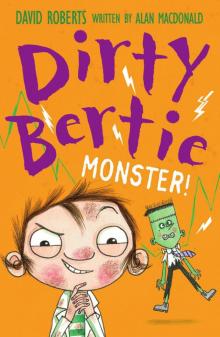 Monster!
Monster!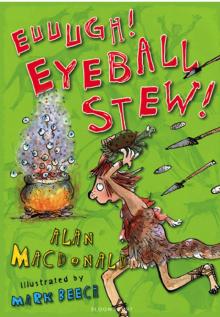 Euuuugh! Eyeball Stew!
Euuuugh! Eyeball Stew! Superstar!
Superstar!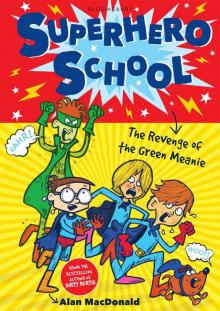 Superhero School
Superhero School Pong!
Pong!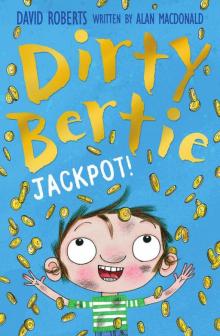 Jackpot!
Jackpot! Aliens!
Aliens!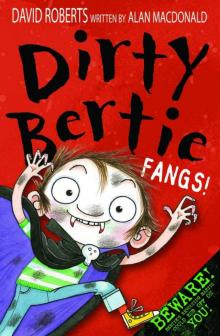 Fangs!
Fangs!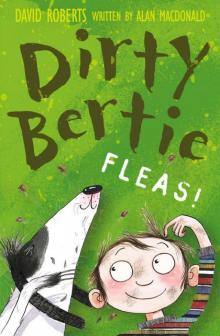 Fleas!
Fleas!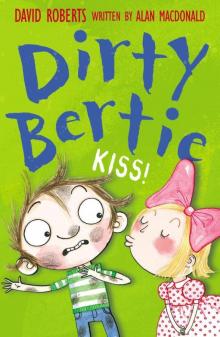 Kiss!
Kiss!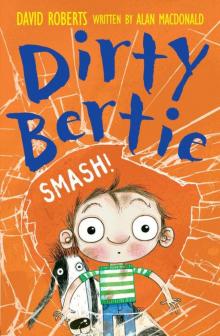 Smash!
Smash!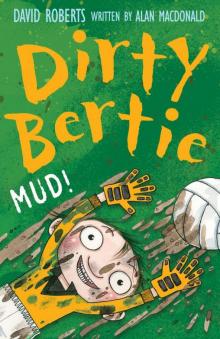 Mud!
Mud!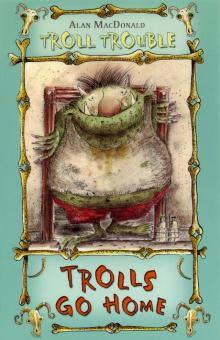 Trolls Go Home!
Trolls Go Home!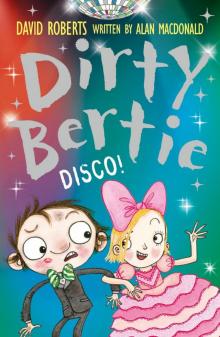 Disco!
Disco!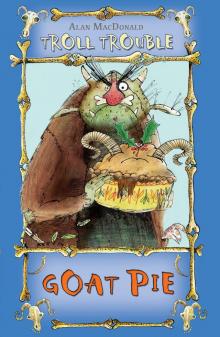 Goat Pie
Goat Pie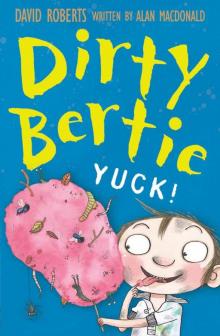 Yuck!
Yuck! Fetch!
Fetch!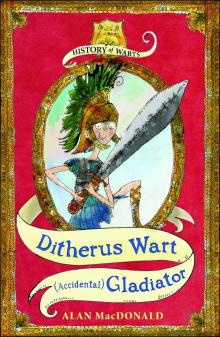 Ditherus Wart
Ditherus Wart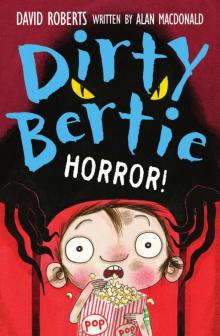 Horror!
Horror! Pirate!
Pirate!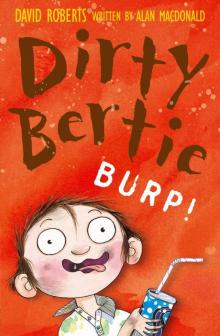 Burp!
Burp!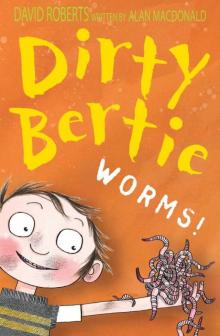 Worms!
Worms! Puppy Love!
Puppy Love!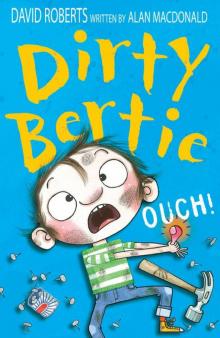 Ouch!
Ouch!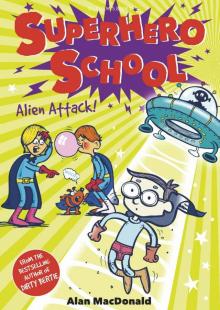 Alien Attack!
Alien Attack!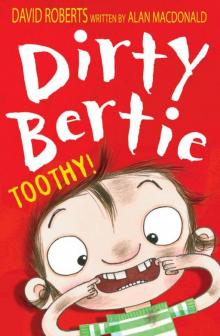 Toothy!
Toothy!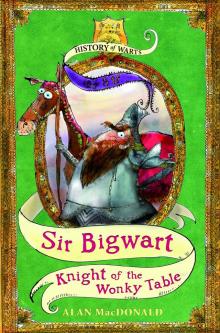 Sir Bigwart
Sir Bigwart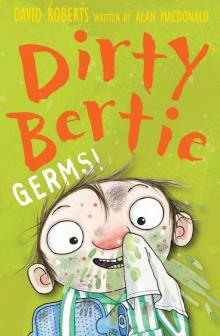 Germs!
Germs!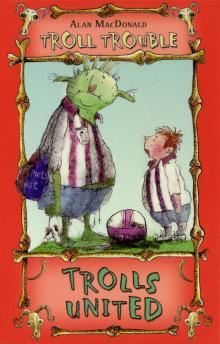 Trolls United
Trolls United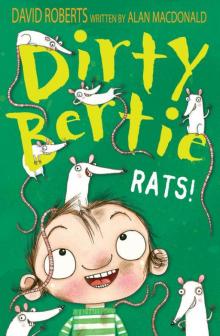 Rats!
Rats!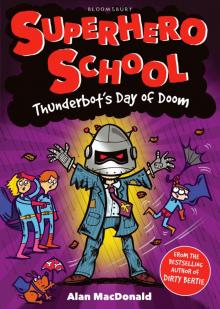 Thunderbot's Day of Doom
Thunderbot's Day of Doom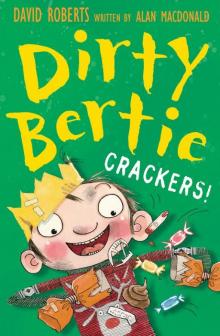 Crackers!
Crackers!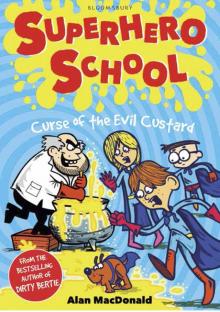 Curse of the Evil Custard
Curse of the Evil Custard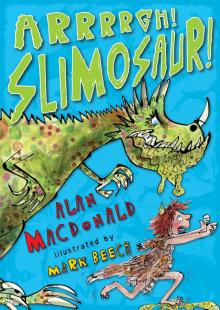 Arrrrgh! Slimosaur!
Arrrrgh! Slimosaur!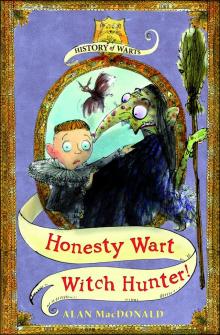 Honesty Wart
Honesty Wart Queen Bee!
Queen Bee! Snow!
Snow!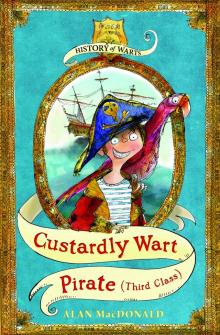 Custardly Wart
Custardly Wart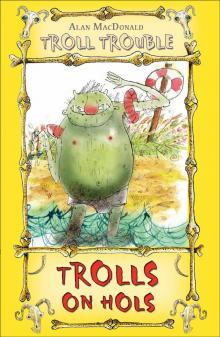 Trolls on Hols
Trolls on Hols Pants!
Pants! Angela Nicely
Angela Nicely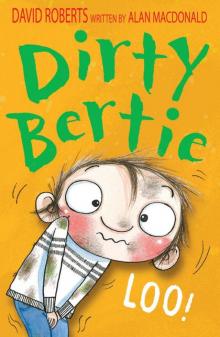 Loo!
Loo!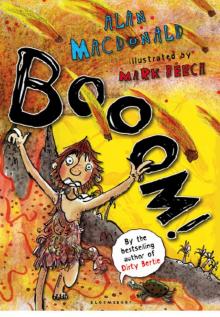 BOOOM!
BOOOM!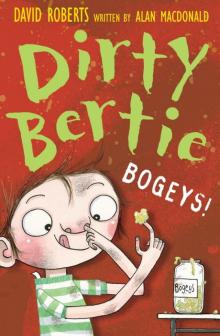 Bogeys!
Bogeys!